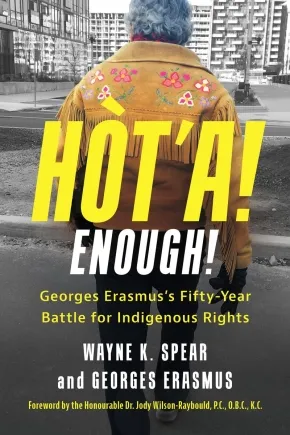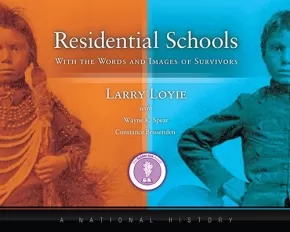Wayne K. Spear
Wayne K. Spear was born in Buffalo, New York, and grew up in Fort Erie, Ontario. A Kanien’kehá:ka (Mohawk), he has worked for more than two decades in health and education. He is a former director of communications at the Aboriginal Healing Foundation (AHF) and currently lives in Toronto, where he works as a communications consultant and freelance writer.
Books (1)
Synopsis:
The political life of Dene leader Georges Erasmus - a radical Native rights crusader widely regarded as one of the most important Indigenous leaders of the past fifty years.
For decades, Georges Erasmus led the fight for Indigenous rights. From the Berger Inquiry to the Canadian constitutional talks to the Oka Crisis, Georges was a significant figure in Canada's political landscape. In the 1990s, he led the Royal Commission on Aboriginal Peoples and afterward was chair and president of the Aboriginal Healing Foundation, around the time that Canada's residential school system became an ongoing frontpage story.
Georges's five-decade battle for Indigenous rights took him around the world and saw him sitting across the table from prime ministers and premiers. In the 1980s, when Georges was the National Chief of the Assembly of First Nations, he was referred to as the "Thirteenth Premier." This book tells the personal story of his life as a leading Indigenous figure, taking the reader inside some of Canada's biggest crises and challenges.
Awards
- 2025 Indigenous Voices Awards - Prose in English Award
Additional Information
320 pages | 6.00" x 9.00" | 57 b&w illustrations | Paperback
Teen Books (1)
Synopsis:
Residential Schools, With the Words and Images of Survivors, A National History honours the survivors, the former students, who attended residential schools. Designed for the general reader this accessible, 112-page history offers a first-person perspective of the residential school system in Canada, as it shares the memories of more than 70 survivors from across Canada as well as 125 archival and contemporary images (65 black & white photographs, 51 colour, some never before published).
This essential volume written by award-winning author Larry Loyie (Cree), a survivor of St. Bernard Mission residential school in Grouard, AB, and co-authored by Constance Brissenden and Wayne K. Spear (Mohawk), reflects the ongoing commitment of this team to express the truths about residential school experiences and to honour the survivors whose voices are shared in this book.
Along with the voices, readers will be engaged by the evocative, archival photographs provided by the Shingwauk Residential Schools Centre with the assistance of curator Krista McCracken. The book begins with the moving introduction by Larry Loyie, and moves to seven chapters that explore the purpose of this school system; cultures and traditions; leaving home; life at school the half-day system; the dark side of the schools; friendship and laughter coping with a new life; changing world–the healing begins; and an afterword. A detailed, full colour map showing residential schools, timeline with key dates, glossary, and a helpful index (including names of survivors and schools) make this vital resource a must-have for secondary, college, and universities, libraries, and the general reader.
Reviews
"A broad and comprehensive review of the history of First Nations, Métis, and Inuit peoples in Canada told from the perspective of First Peoples in a very accessible way. Any educator, regardless of personal background or heritage, would find this timely resource very useful in any classroom." — Gary Fenn and Domenic Bellissimo, executive assistants, Ontario Secondary School Teachers’ Federation
"Written with a gentle hand, this book describes a history that few Canadians understand or even know about. From the first page, those in search of the truth are engaged in a journey of learning, as they come to understand the true battle of Aboriginal peoples to preserve their cultures and pride. This story is a true account of resiliency and human spirit." — Tracy Zweifel, executive director, Sagitawa Friendship Society, Alberta
Awards
- 2016 Winner of Golden Oak award in Ontario's Forest of Reading program
Educator Information
This must-have resource includes a detailed, full-colour map showing residential schools, a timeline with key dates, and a glossary.
Recommended for grades 7-12, but would still be useful for adults and college/university courses studying residential schools and Indigenous history.
This book has been evaluated and approved by ERAC (Educational Resource Acquisition Consortium, British Columbia).
Additional Information
112 pages | 10.43" x 8.26"








